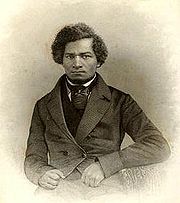
My Bondage and My Freedom
Encyclopedia

Slave narrative
The slave narrative is a literary form which grew out of the written accounts of enslaved Africans in Britain and its colonies, including the later United States, Canada and Caribbean nations...
written by Frederick Douglass
Frederick Douglass
Frederick Douglass was an American social reformer, orator, writer and statesman. After escaping from slavery, he became a leader of the abolitionist movement, gaining note for his dazzling oratory and incisive antislavery writing...
and published in 1855. It is the second of three autobiographies written by Douglass, and is mainly an expansion of his first (Narrative of the Life of Frederick Douglass), discussing in greater detail his transition from bondage to liberty. Following his liberation, Douglass, a former slave, went on to become a prominent abolitionist
Abolitionism
Abolitionism is a movement to end slavery.In western Europe and the Americas abolitionism was a movement to end the slave trade and set slaves free. At the behest of Dominican priest Bartolomé de las Casas who was shocked at the treatment of natives in the New World, Spain enacted the first...
, speaker, author, and publisher.
In his foreword to the 2003 Modern Library paperback edition, John Stauffer writes: “My Bondage and My Freedom,” [is] a deep meditation on the meaning of slavery, race, and freedom, and on the power of faith and literacy, as well as a portrait of an individual and a nation a few years before the Civil War. As his narrative unfolds, Frederick Douglass—abolitionist, journalist, orator, and one of the most powerful voices to emerge from the American civil rights movement—transforms himself from slave to fugitive to reformer, leaving behind a legacy of social, intellectual, and political thought. The 1855 text includes Douglass’s original Appendix, composed of excerpts from the author’s speeches as well as a letter he wrote to his former master.
Literature
- Chaney, Michael A. "Picturing the Mother, Claiming Egypt: My Bondage and My Freedom as Auto(Bio)Ethnography." African American Review 35.3 (2001): 391-408.
- Richardson, Mark. "Frederick Douglass' My Bondage and My Freedom." American Writers Classics, I. Ed. Jay Parini. New York, NY: Thomson Gale, 2003. 163-82. ISBN 0-684-31248-4
- Stauffer, John. The Black Hearts of Men: Radical Abolitionists and the Transformation of Race. Cambridge, Mass.: Harvard University Press, 2002. ISBN 0-674-00645-3 (alk. paper)
- Trafton, Scott Driskell. Egypt Land: Race and Nineteenth-Century American Egyptomania. New Americanists. Durham, N.C.: Duke University Press, 2004. ISBN 0-8223-3362-7
External links
- My Bondage and My Freedom, publicly-available e-text at the University of Virginia.

